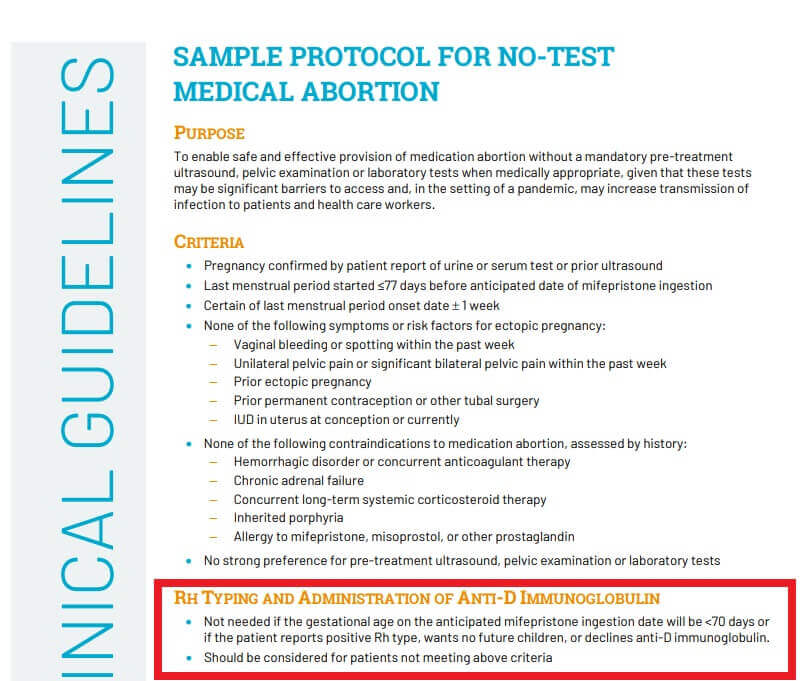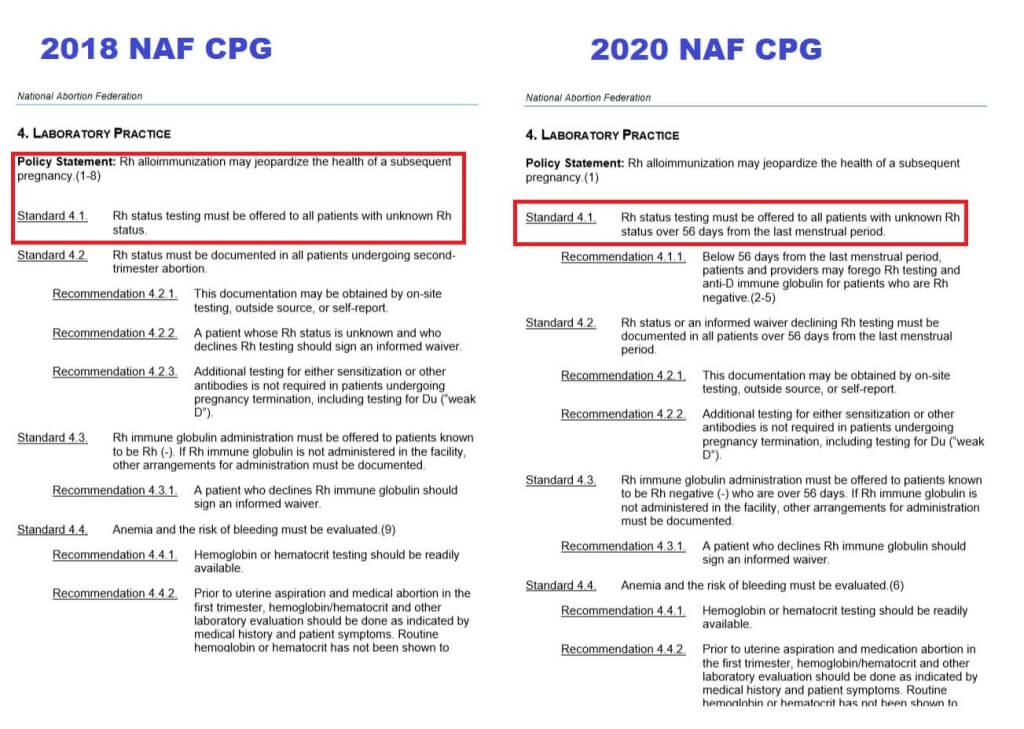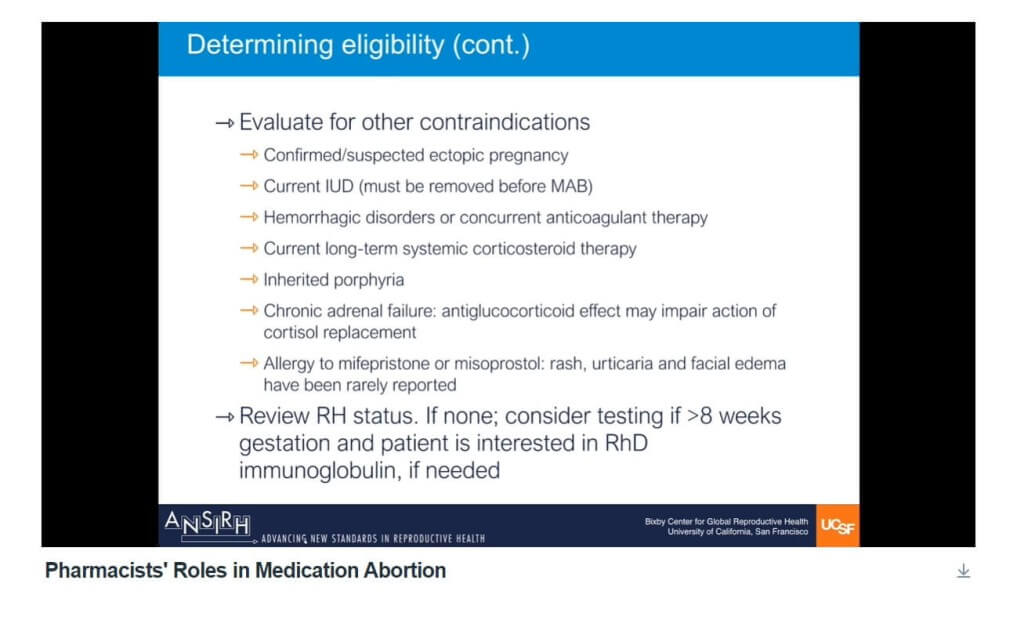Playback speed:
Editor’s Note: This article is the second in a series. Read the first here… Bad Actors #1.
During the COVID-19 pandemic, the abortion industry began utilizing what it referred to as a “no-test” protocol when prescribing the abortion pill to women. As the name implies, this protocol – planned well before the pandemic – does not require women to have any ultrasound, diagnostic tests, blood tests, or exams before a prescriber dispenses the abortion pill. This means the gestational age of the preborn child is based on the woman’s “best guess,” and potentially deadly complications — like ectopic pregnancy — are not ruled out before a woman receives the drug regimen.
The U.S. Food and Drug Administration’s (FDA) abortion pill regulations, known as REMS (Risk Evaluation and Mitigation Strategies), require that prescribers of the abortion pill are to have the “[a]bility to assess the duration of pregnancy accurately” and the “[a]bility to diagnose ectopic pregnancies.” Yet, when prescribers knowingly place women at risk by choosing not to assess either the duration of pregnancy or an ectopic pregnancy via the no-test protocol, it appears that nothing is done about it; there are no penalties.
This is because the FDA granted the abortion pill manufacturers, Danco and GenBioPro, full control over which prescribers are certified or de-certified to dispense the drug.
The no-test protocol puts women at risk
The virtual abortion pill dispensary Hey Jane tells abortion pill clients, “If you have a medication abortion without having an ultrasound first, there is a small chance that you could have an undetected ectopic pregnancy. Medication abortion will not end an ectopic pregnancy, so if you do not pass tissue and blood after taking the misoprostol (the second medicine), you might have an ectopic pregnancy.”
The online abortion pill website goes on to explain:
“Since Hey Jane does not require blood tests or ultrasounds:
- “Your risk for an undiagnosed ectopic pregnancy (a pregnancy outside the uterus) may be increased. Ectopic pregnancies are very rare.
- “It is possible that your pregnancy dating (how far along you are in your pregnancy) could be inaccurate. Taking the abortion pills later in your pregnancy is not unsafe; however, you can have more bleeding or the treatment may not work.”
It is clear that despite the requirement under the FDA’s REMS that prescribers have ability to properly determine gestational age and rule out dangerous ectopic pregnancies, the industry is placing all responsibility for knowing this information squarely on the shoulders of the abortion clients themselves.
In 2020, when the abortion industry implemented the “no-test” protocol, it did so despite openly admitting that no-test “criteria are not going to rule out every ectopic pregnancy.”
During this time, details of the no-test protocol were discussed at length among high-ranking abortion industry insiders in a webinar. There, Elizabeth Raymond, MD (Senior Medical Associate, Gynuity Health Projects) said the goal of the protocol was “to develop a protocol to enable safe and effective provision of medical abortion without facility-based tests, that is ultrasounds, blood tests, or pelvic exams.” She added, “Basically, this means that the entire medical abortion procedure can be done simply by talking with the patient. No physical contact needed. And, indeed, it can all be done remotely without any in-person visit to a clinic except for perhaps pill-pickup.”
Raymond later flippantly claimed, “Again, these criteria are not going to rule out every ectopic pregnancy. But the incidence of ectopic pregnancy among patients seeking medical abortion is low anyway — less than 1%. And we can detect ectopics after treatment….”
After treatment?
She later advised, “Each patient should understand that the no-test approach does have its own risks. As I mention, the gestational age could be underestimated, which means that the treatment would have lower efficacy than expected and bleeding and cramping could be heavier. And, in addition the patient may see fetal tissue when the pregnancy is expelled. Also, the patient may have an undetected ectopic pregnancy.”
Abortion industry heavy hitters are basically suggesting that they will deal with ectopics after the woman begins the abortion pill regimen and reports back that she was still pregnant, assuming there is a follow-up at all. There are many problems with this flippant so-called “care” — time is of the essence, given that an ectopic pregnancy grown inside the mother’s fallopian tube can rupture and become fatal if not caught in time. And the abortion industry, of its own admission, does not follow-up with every abortion pill client.
In just one example, Christie Pitney of Forward Midwifery, a MYA Network member, recently told Ms. Magazine that her online abortion pill dispensary spends an average of “five minutes or less” with most abortion pill clients. She also admitted, “We don’t schedule any sort of follow up. We tell the patients that they can call us at any time, though.” Pitney then added that Forward Midwifery abortion clients “[r]arely[,] [l]ess than 10 times ever” follow-up after taking the pills.
Emergency room physicians see abortion pill clients
A recent study of abortion pill adverse events found that abortion pill complications are underreported, and abortion pill clients experiencing complications are more likely to receive care from an emergency center than the abortion facility. Yet, if abortion industry profiteers would medically rule out ectopic pregnancies, women’s lives would not be placed in as much risk.
In fact, emergency department doctors (some openly admitting to be pro-abortion) recently presented the case of a woman who took the abortion pill and was later treated in the emergency room for an undiagnosed ectopic pregnancy. But disturbingly, rather than put the onus on the abortion industry for failing to appropriately identify the potentially deadly complication beforehand, the group of medical doctors warned ER doctors to be on alert as abortion clients present to emergency departments for care after taking the abortion pill.
At the same time, however, abortion industry power players are encouraging women to tell ER doctors they are naturally miscarrying when they are actually experiencing abortion pill complications.
Live Action News previously documented the case of a woman in India who died after taking the abortion pill while unwittingly experiencing an ectopic pregnancy. The report indicates the woman purchased the drugs over the counter at a pharmacy, something the American abortion industry is hoping to fast-track in the U.S.
The report, which included shocking autopsy images, read in part: “Here, the deceased had tested herself positive with a commercially available urine pregnancy test kit and then bought and used mifepristone and misoprostol from a pharmacy without consulting a doctor. She then developed acute abdominal pain and bleeding per vagina and died from haemorrhagic shock.”
The report also stated that “she developed severe abdominal pain and bleeding per vagina and was taken to a hospital. On arrival, she was hypotensive, in shock and could not be revived. She was declared dead in the emergency room.” The “[a]utopsy revealed a ruptured ectopic pregnancy (tubal type).”
Even the abortion pill’s own manufacturer, Danco Laboratories, has claimed that “[a]dministration of MIFEPREX and misoprostol for the termination of pregnancy is contraindicated in patients with any of the following conditions: Confirmed or suspected ectopic pregnancy…”
In a recent press release, Danco went on to warn that “[h]ealthcare providers should remain alert to the possibility that a patient who is undergoing a medical abortion could have an undiagnosed ectopic pregnancy because some of the expected symptoms experienced with a medical abortion (abdominal pain, uterine bleeding) may be similar to those of a ruptured ectopic pregnancy.”
Rh blood typing and pregnancy dating
According to a handbook of maternal mortality published by the Charlotte Lozier Institute (CLI), “unsupervised chemical abortions are being increasingly promoted to women,” due in part to the Biden FDA weakening the REMS safety system to allow mail order dispensing of the drug.
“However, failed abortion from underestimation of gestational age (resulting in more tissue to be expelled and often requiring surgery), missed diagnosis of ectopic pregnancy due to failure to perform ultrasound (these medications do not treat an ectopic), and missed opportunity for RhoGAM immunoprophylaxis (if not given, may cause the mother to produce an immune response against the fetus in future pregnancies) are all events that can increase the risk of maternal mortality in current or future pregnancies,” CLI’s Senior Fellow and Director of Medical Affairs Ingrid Skop wrote.
Skop told Live Action News, “If a woman is Rh negative and her partner is Rh positive, their unborn child might also be Rh positive. To prevent problems in a subsequent pregnancy, a shot called RhoGAM has traditionally been given to prevent antibody formation if blood mixes during childbirth, trauma, miscarriage, or abortion. Without this protection, a woman’s immune system may attack her future unborn children, leading to miscarriage, stillbirth, or brain damage.”
Live Action News previously documented how abortion industry actors are prescribing the abortion pill past the FDA approved limit of 70 days/10 weeks and how the no-test protocol now operates on a “believe the women” system rather than accurately verifying gestational age with blood work or ultrasound.
While the FDA’s REMS protocol for mifepristone does not require specific labs, exams, or ultrasounds, best medical practices point to the need to confirm a pregnancy, rule out an ectopic pregnancy, determine gestational age by means other than the woman’s “best guess,” and screen for negative Rh blood factor.
Yet, abortion insiders suggested in the previously mentioned webinar that if a woman states she does not want any future children, there would be no need to offer a blood test to confirm the possibility of an Rh negative blood type nor administer RhoGAM.
“RH typing and administration of Anti-D Immunoglobulin not needed if the gestational age on the anticipated mifepristone ingestion date will be <70 days or if the patient reports positive Rh type, wants no future children, or declines anti-D immunoglobulin,” a no-test protocol document published online stated.

Gynuity No-Test abortion pill protocol on Rh negative clients
In 2018, the National Abortion Federation’s (NAF) clinical guidelines said that “all patients with unknown Rh status” must be tested before an abortion. But in 2020, NAF’s new guidelines — published prior to the launch of the no-test protocol — changed these recommendations, claiming, “It is reasonable to forego Rh testing and anti-D immunoglobulin for women having any type of abortion before 56 days. Foregoing Rh testing and anti-D immunoglobulin for those using medication abortion before 70 days LMP may also be considered.”

NAF RH Testing on abortion patients 2018 v 2020 CPG
Yet, in a continuing education class recently published by the pro-abortion group Advancing New Standards in Reproductive Health (ANSIRH), Dr. Daniel Grossman, the principal investigator in the abortion pill pharmacy trials, tells pharmacists to consider testing for Rh-negative blood after eight weeks of pregnancy when prescribing the FDA approved abortion pill regimen.
Grossman’s slide below failed to inform pharmacists that the industry is currently operating from a no-test protocol position.

RH Negative ANSIRH screen in pharmacy abortion pill class provided by Daniel Grossman
The no-test abortion pill protocol can place women at risk and seems to be in direct opposition to the intent behind the FDA’s safety regulations. But, as Live Action News has previously reported, those policing the abortion industry are not knowledgeable FDA officials — they are the manufacturers of the abortion pill.
It would therefore be foolish to assume that the safety of women is paramount in such an arrangement.


